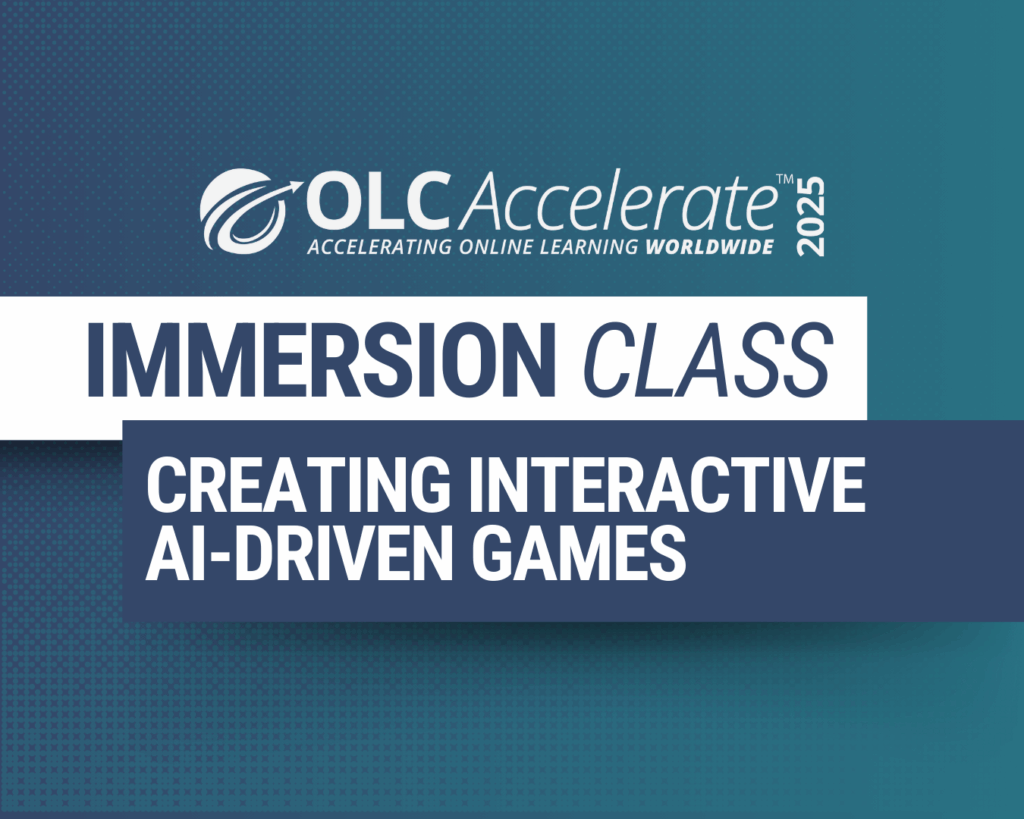You’ve seen AI write emails, generate lesson plans, and quiz questions, but have you seen it play? Now, imagine students stepping into a learning game with AI as a responsive player that adapts, reacts, guides, and challenges.
For the past couple of years, educators have been experimenting with generative AI tools like OpenAI to speed up feedback, write lesson plans, or personalize support. But something more exciting is emerging—AI as a player in educational simulations. Not a tool you use to design content, but a responsive, interactive presence inside the experience itself.
At the OLC Accelerate Conference in Orlando this year, I’m leading a three-hour, hands-on workshop called “Creating Interactive AI-Driven Games for Educational and Experiential Learning Using Boodlebox.ai and OpenAI.” You’ll learn to build custom AI game bots—playable characters powered by language models—and use them to create educational games, simulations, and practice scenarios you can immediately apply in your own context.
And here’s the twist: you won’t be doing it alone. Throughout the session, you’ll be working with three purpose-built AI bots to guide your design process from idea to implementation.
Wait, What’s an AI Game Bot?
Think chatbot, but inside a learning scenario.
Imagine a team-based game where learners take on roles—say, in a healthcare simulation—with an AI filling in for the social worker who couldn’t make it. Or a solo practice session where a nursing student verbally walks through a patient case while an AI plays the attending physician, coaching and questioning as needed. Or even a creative writing simulation where students debate ethics with AI characters who don’t break role.
These aren’t distant dreams. We’ll build them together in just a few hours.
The Three Bots Guiding You
The workshop is scaffolded around three custom AI bots, each focused on a key phase of your game design:
- The Learning Objective Bot helps you clarify the goals of your simulation and align them with real-world applications. Whether you’re teaching teamwork, ethical reasoning, clinical judgment, or decision-making, this bot will push you to articulate your desired learning outcomes clearly.
- The Game Type Selector Bot, once your goals are defined, helps you choose the right type of game: collaborative, competitive, role-based, branching scenario, etc. It balances audience, format, and outcomes to recommend the game structure that makes sense for your context.
- The Assessment Builder Bot – finally, you’ll use this bot to craft performance-based assessments tailored to your game. It offers strategies to measure how well players meet learning objectives using observable behaviors, decision tracking, or AI-generated feedback aligned to Bloom’s Taxonomy.
What We’ll Actually Do
The structure of the workshop moves from exposure to creation to hands-on application:
- Live Demo: We’ll begin with a multiplayer healthcare simulation built in Boodlebox. This game showcases how AI can fill in unassigned roles, respond to player actions in real time, and provide feedback that fosters reflection and improvement.
- Design Sprint: Using the three custom bots, you’ll work in small groups to design your own AI-powered game on any topic you choose. From nursing education to business negotiation to theological case studies, you’ll define roles, structure the gameplay, and embed dynamic AI interactions.
- Solo Practice with OpenAI: I’ll show you how to adapt your multiplayer game into a single-player, mobile-friendly format using OpenAI and voice commands. This opens the door to hands-free learning for students in clinicals, on the go, or in remote environments.
No coding required. Just bring your ideas and curiosity.
Why Games? Why Now?
Simulation-based learning is powerful, but also expensive and resource-intensive. AI changes that. It lets educators create scalable, responsive simulations that feel personal, even when there’s no human facilitator.
These AI game bots aren’t just clever; they’re capable of tracking decision trees, shifting roles, evaluating behaviors, and giving personalized feedback. And since the games you create in this workshop are yours to keep, you’ll walk away with something you can use, remix, and expand long after the conference ends.
Who Should Attend?
This workshop is perfect for:
- Educators and instructional designers looking to create more engaging and realistic learning experiences
- Faculty developers exploring how to support professors in designing simulation-based learning
- Trainers and coaches working in healthcare, business, law enforcement, counseling, or leadership development
- Anyone who wants to create practice-rich environments without building full custom software
If you’ve been tinkering with AI in your teaching but haven’t moved past chat prompts and productivity hacks, this is your next step.
What You’ll Walk Away With
By the end of the session, you’ll have:
- A working prototype of an AI-powered multiplayer game
- A single-player voice-activated OpenAI demo
- Access to three reusable design bots for future projects
- Hands-on experience creating bots
- A framework to bring AI-driven experiential learning into your courses or programs
But more than that, you’ll leave with a vision and a toolkit for what teaching and learning can look like when AI is woven into the experience itself, not just sitting on the sidelines.
Let’s build something that teaches, coaches, and plays alongside our students.
Join us in Orlando and let’s make bots that engage learners, deliver experiences, and shape thinking.
Ready to dive in further? Join Michael Jones and Tasha Bleistein on Monday, November 17 for their Immersion Session, “Creating Interactive AI-Driven Games for Educational and Experiential Learning Using AI Tools” at OLC Accelerate 2025.
Explore the full lineup of Pre-Conference Immersion Classes.
 Mike Jones is the Assistant Director of Indiana Wesleyan University’s Future Learning Lab. He is also a Screenwriter, Course Writer, Adjunct Professor, AI-Enthusiast, and XR Developer at Indiana Wesleyan University. With degrees in Writing and Directing, Business Information Systems, and a Screenwriting MFA, Mike’s passion lies at the creative intersection of faith, technology, and teaching. Married for 33 years, he cherishes time with his three children, their spouses, and four grandchildren. Additionally, he has been an integral part of the team pioneering IWU’s groundbreaking foray into AI-enhanced course redesign, showcasing his fascination with innovative tools and techniques.
Mike Jones is the Assistant Director of Indiana Wesleyan University’s Future Learning Lab. He is also a Screenwriter, Course Writer, Adjunct Professor, AI-Enthusiast, and XR Developer at Indiana Wesleyan University. With degrees in Writing and Directing, Business Information Systems, and a Screenwriting MFA, Mike’s passion lies at the creative intersection of faith, technology, and teaching. Married for 33 years, he cherishes time with his three children, their spouses, and four grandchildren. Additionally, he has been an integral part of the team pioneering IWU’s groundbreaking foray into AI-enhanced course redesign, showcasing his fascination with innovative tools and techniques.





